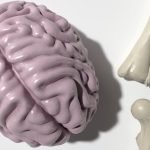Heart disease linked to rise in Alzheimer’s protein, study finds
Recent research indicates that heart disease might be a significant factor in early brain dysfunction, which can potentially lead to dementia.
Moreover, heart disease can...
Blood vessel damage could drive Alzheimer’s disease
Recent research from Cedars-Sinai reveals that abnormalities in blood vessels in the eye play a significant role in the progression of Alzheimer's disease.
This groundbreaking...
This eye disease linked to higher risk of Alzheimer’s disease
Glaucoma is like a thief. It damages a part of our eye that sends signals to our brain. This part is called the optic...
Scientists use AI to predict Alzheimer’s disease effectively
A group of scientists from Cornell University recently conducted a study using computer programs that learn by themselves.
The aim was to find the best...
A new method to spot Alzheimer’s and dementia early
Diseases that affect the brain, like Alzheimer's and dementia, often start changing the brain long before people start to feel unwell.
This makes these diseases...
Scientists find a way to detect Alzheimer’s early
Imagine if we could predict who will get Alzheimer's disease before it even starts to show symptoms.
Alzheimer's is a disease that affects a person's...
Scientists use radiation to treat Alzheimer’s disease
Amyloid deposition, a process characterized by misfolded proteins assembling into oligomers and then into fibrils, is a common feature in neurodegenerative diseases like Alzheimer's...
Scientists find how to predict mild cognitive impairment years before symptoms
Have you ever thought about what happens inside our bodies that can cause diseases like Alzheimer's?
Scientists are always curious about these questions, and they...
Alzheimer’s disease may also pose a risk for a unique form of heart failure
While June marks Alzheimer's Awareness Month, a new study indicates that people living with Alzheimer's disease (AD) might also be at risk for a...
Third Alzheimer’s drug expected to advance treatment but further research needed
With the anticipation of a third Alzheimer's drug, donanemab, likely to be approved by the FDA, advancements are being made in treating the early...










